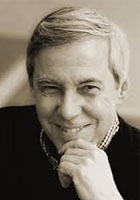David Trinidad
David Trinidad Poems
I went to his sixty-sixth birthday
dinner: sixteen years ago this past
November. I remember that it was at
Chelsea Central (his favorite restaurant:
...
The night reduced to a siren, a sigh:
Beautiful boy on the treadmill
Glimpsed sweating through sweating glass—
...
Bewitched
the boys were out
in force
Drunken-
ness and lust
...
To be one such one—for one night only.
To be singled out
for this brief distinction
...
In color photographs, my childhood house looks
fresh as an uncut sheet cake—
pale yellow buttercream, ribbons of white trim
...
David Trinidad Biography
David Trinidad is the author of more than a dozen books, including Peyton Place: A Haiku Soap Opera (2013), Dear Prudence: New and Selected Poems (2011), The Late Show (2007), and Plasticville (2000), a finalist for the Lenore Marshall Poetry Prize. He has received awards from The Fund for Poetry and the New York Foundation for the Arts, and his work has appeared in numerous periodicals and several anthologies, including Best American Poetry, The Outlaw Bible of American Poetry, and Postmodern American Poetry: A Norton Anthology. Trinidad was born in Los Angeles, was raised in the San Fernando Valley, and moved to New York City in 1988. Much of his work investigates the cultural landscapes of America’s great metropolises, as well as the culture at large. His poems are often filled with references to television, movies, and music, while also being populated by very real people and problems. The autobiographical impulse in poets such as Anne Sexton, Frank O’Hara, Sylvia Plath, and James Schuyler can also be seen in Trinidad’s work, as can masterful threads of both elegy and celebration. In a New York Times review, Eric McHenry calls Trinidad’s “greatest gift” the “ability to dignify the dross of American life, to honor both the shrink-wrapped sentiment of the cultural artifacts he writes about and his own much more complicated response to them.” Trinidad has also edited an anthology of collaborative poetry, the selected poems of Tim Dlugos and of Ann Stanford, and the journal Court Green, published out of Columbia College, where he teaches. He has also taught at Princeton, The New School, Rutgers, and Columbia. In June 2014, Trinidad was a featured writer for Harriet.)
The Best Poem Of David Trinidad
James Schuyler
I went to his sixty-sixth birthday
dinner: sixteen years ago this past
November. I remember that it was at
Chelsea Central (his favorite restaurant:
great steaks) on 10th Avenue, and
that Ashbery was there, and a few
others, including Joe, impeccably
dressed and gracious, who picked up
what must have been (I thought
at the time) an exorbitant bill.
I remember him saying more than
once, "Joe always picks up the bill,"
then smiling a slightly wicked smile.
Sitting with him (those excruciating
silences!) in his room at the Chelsea,
my eyes would wander from his book-
shelves (The Portrait of a Lady stood out)
to the pan of water on the radiator
to the records strewn on the floor
to some scraggly plants (ivy? herbs?)
in ceramic pots at the base of the French
doors that opened to the balcony and
balustrade and sound of traffic on 23rd
Street six floors below. He read me
"White Boat, Blue Boat" shortly after he
wrote it, and a poem about Brook Benton
singing "Rainy Night in Georgia" that
didn't make it into his Last Poems, though
I remember thinking it beautiful. He
complained, in a letter to Tom, about
how much I smoked, and how emotional
I'd get during movies: he must have been
referring to Field of Dreams (he had a yen
for Kevin Costner). When he took me
to see L'Atalante, a film he loved, I was
bored. Once, we took the subway (he
hadn't ridden it in years) to the Frick;
I remember admiring Romney's Lady
Hamilton. It hurt that he didn't invite
me to the dinner after his Dia reading
or to the reception after his reading at the
92nd Street Y, though he did, at the latter,
read "Mood Indigo," dedicated to me.
When he said my name from the stage,
Joan and Eileen, sitting to my left, turned
and stared at me; frozen by the enormity
of the moment, I couldn't look back.
When he came to a reading I gave at
St. Mark's, Raymond impressed upon
me what an honor it was: Jimmy didn't
go to many poetry readings. What else
is there to say? That when I visited him
at St. Vincent's the day before he died
Darragh said, "He likes to hear gossip."
So I said, "Eileen and I are talking again."
That at his funeral I sat alone (Ira couldn't
come): that that was the loneliest feeling
in the world. That afterwards Doug said
"You look so sad." How should I have
looked, Doug! And that a year after he
died, I dreamt I saw him in the lobby of
the Chelsea Hotel. He was wearing a
hospital shift and seemed to have no
muscle control over his face—like in inten-
sive care after his stroke. He saw me
and said, "It's nice to see some familiar
faces." I approached him, but he
disappeared.
